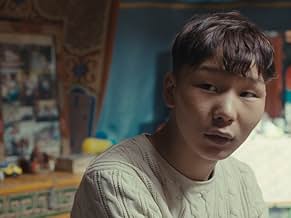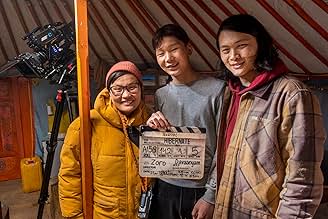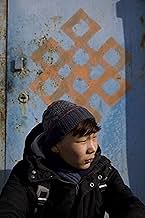VALUTAZIONE IMDb
7,2/10
869
LA TUA VALUTAZIONE
Ulzii, un adolescente povero ma orgoglioso, decide di vincere un concorso di fisica per una borsa di studio, ma sua madre analfabeta trova lavoro in campagna e lo lascia con i suoi fratelli ... Leggi tuttoUlzii, un adolescente povero ma orgoglioso, decide di vincere un concorso di fisica per una borsa di studio, ma sua madre analfabeta trova lavoro in campagna e lo lascia con i suoi fratelli in pieno inverno.Ulzii, un adolescente povero ma orgoglioso, decide di vincere un concorso di fisica per una borsa di studio, ma sua madre analfabeta trova lavoro in campagna e lo lascia con i suoi fratelli in pieno inverno.
- Regia
- Sceneggiatura
- Star
- Premi
- 7 vittorie e 8 candidature totali
Recensioni in evidenza
In a one-room ger in the Mongolian capital, Ulaanbaatar, lives lanky teenager Ulzii; his widowed, alcoholic mother; and his three siblings. His mother is unable to earn enough to feed all her children and it falls to Ulzii to supplement the family income by doing odd-jobs - unloading a van or delivering meat, for example. But he has a special, intuitive talent for physics, and an inspirational schoolteacher suggests he enter the national physics competition (yes, such things exist - introducing the film at the 2023 London Film Festival, editor Alexandra Strauss explained that although this film is a work of fiction, it is based on a documentary). If Ulzii wins, he will get a scholarship. But with all of his family responsibilities, can he put in the time required for study?
For Western audiences, a film from Mongolia is a rare treat. As well as the central plotline, the film also provides a look at modern Mongolia, where ancient traditions meld with today's way of life: in one scene Ulzii is sent to visit his aunt in her modern, high-rise flat in order to place his big toe in his infant nephew's mouth - this, apparently, is a sure-fire way to cure a facial rash. As the film progresses (writer/director Zoljargal Purevdash cleverly marking the passage of time by every so often changing Ulzii's hairstyle) we see Mongolian teenagers acting like teenagers anywhere: play-fighting, playing sports, lusting after a pair of stylish trainers.
The adventures of a physics student does not sound like a promising subject for a film and it is interesting to speculate whether this film would have worked if it were set in the UK or US; I suspect not. But set in a country that rarely features in Western entertainment, it works a treat.
For Western audiences, a film from Mongolia is a rare treat. As well as the central plotline, the film also provides a look at modern Mongolia, where ancient traditions meld with today's way of life: in one scene Ulzii is sent to visit his aunt in her modern, high-rise flat in order to place his big toe in his infant nephew's mouth - this, apparently, is a sure-fire way to cure a facial rash. As the film progresses (writer/director Zoljargal Purevdash cleverly marking the passage of time by every so often changing Ulzii's hairstyle) we see Mongolian teenagers acting like teenagers anywhere: play-fighting, playing sports, lusting after a pair of stylish trainers.
The adventures of a physics student does not sound like a promising subject for a film and it is interesting to speculate whether this film would have worked if it were set in the UK or US; I suspect not. But set in a country that rarely features in Western entertainment, it works a treat.
I saw this film today at the Braunschweig International Film Festival and I was deeply moved.
The story is about the self chosen responsibility of a boy for his two younger siblings because their widowed mother could not feed them. When he realized that her mother wants to move them back to the countryside, he spoke up for himself and the two younger siblings because he saw the importance of going to school.
Left alone by the mother, he is torn between earning money, going to school and caring for his younger siblings. The film shows the daily difficulties surviving in a yurt even when there is little heat and little to eat. A wonderful film with excellent characters.
The story is about the self chosen responsibility of a boy for his two younger siblings because their widowed mother could not feed them. When he realized that her mother wants to move them back to the countryside, he spoke up for himself and the two younger siblings because he saw the importance of going to school.
Left alone by the mother, he is torn between earning money, going to school and caring for his younger siblings. The film shows the daily difficulties surviving in a yurt even when there is little heat and little to eat. A wonderful film with excellent characters.
Cinematography decent, phasing great, story not half bad. Use of Mise-en scene and Chekhov's gun are non existent. Things just tend to happen. Much of the dramatic aspects are just told or has no impact, obviously because it was never built upon. Some concepts are hard for foreign audience to understand. To the director and writer of this film:
SHOW NOT TELL!
Since it's director's first feature film it's decent better than what's coming out today in Mongolian film industry. But it's not great achievement or whatever most people say it is. Honestly it would be shameful if this film was ever to be applied to Academic awards.
Since it's director's first feature film it's decent better than what's coming out today in Mongolian film industry. But it's not great achievement or whatever most people say it is. Honestly it would be shameful if this film was ever to be applied to Academic awards.
I know next to nothing about Mongolia, which was an additional reason why I wanted to see this fantastic film. So thanks to it, I travelled around this country and saw both the new-built capital city as well as the outskirts and the countryside, where the main character, a teenager Ulzii lives with his troubled mother and three younger siblings. I've seen colder winters, but without enough coal and wood there's no way of surviving in the yurt.
From what I understand it is not in the culture to ask for help when in need, so Ulzii is faced with decisions to make, which leads him straight into adulthood.
This heartwarming picture reminds us of so many essential things such as responsibility for the young in the family, the importance of education, caring for the climate both in your yurt and your world, modest living and many others. I left the cinema with a smile on my face and in my heart.
From what I understand it is not in the culture to ask for help when in need, so Ulzii is faced with decisions to make, which leads him straight into adulthood.
This heartwarming picture reminds us of so many essential things such as responsibility for the young in the family, the importance of education, caring for the climate both in your yurt and your world, modest living and many others. I left the cinema with a smile on my face and in my heart.
Really very good. Poignant socio-economic portrait of city life in modern Mongolia, more particularly of poor people who wish to get by by acquiring a good education, among other things. The harsh and cruel side often associated with extreme poverty, hard to receive, is relevant, effective and striking. We also see all the resilience, mutual aid and generosity that human beings can demonstrate. The point presented can be transposed almost anywhere in the world, even in so-called rich countries. Excellent soundtrack to support the story. The recurring musical theme is very beautiful and moving. However, at the beginning of the film, there is an error in the translation of a mathematical term, in the subtitles, surely coming from the fact that the translation was done from Mongolian to English, then to French (confusion between ''integrals'' and ''integers'' which gives ''integers'' in the translation rather than the correct term ''integrals''). A relatively open ending, as is customary in films from the Orient. This work presents us with beautiful life lessons. Good duration.
Lo sapevi?
- QuizOfficial submission of Mongolia for the 'Best International Feature Film' category of the 97th Academy Awards in 2025.
- ConnessioniReferenced in Radio Dolin: Oscars 2024: The Best Films from around the World (2023)
I più visti
Accedi per valutare e creare un elenco di titoli salvati per ottenere consigli personalizzati
- How long is If Only I Could Hibernate?Powered by Alexa
Dettagli
- Data di uscita
- Paesi di origine
- Sito ufficiale
- Lingua
- Celebre anche come
- If Only I Could Hibernate
- Luoghi delle riprese
- Ulan Bator, Mongolia(setting of the action)
- Aziende produttrici
- Vedi altri crediti dell’azienda su IMDbPro
Botteghino
- Lordo in tutto il mondo
- 358.502 USD
- Tempo di esecuzione1 ora 39 minuti
- Colore
- Proporzioni
- 2.35 : 1
Contribuisci a questa pagina
Suggerisci una modifica o aggiungi i contenuti mancanti

Divario superiore
What is the Spanish language plot outline for Se solo fossi un orso (2023)?
Rispondi















